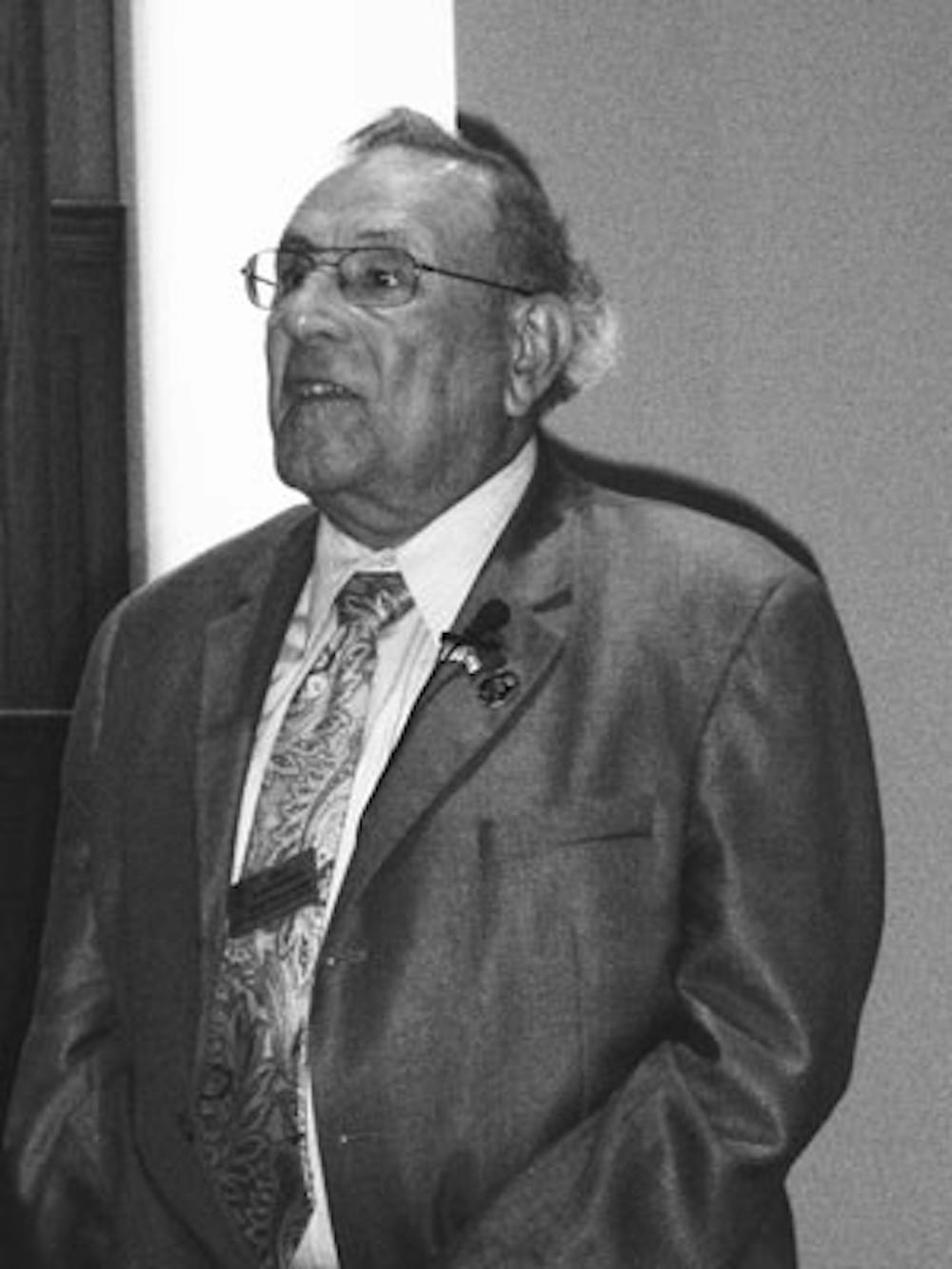The devastating effects of hatred consumed Alexander Lebenstein until he got a letter from students in the German town where he grew up, where he was a victim of Kristallnacht in 1938.
"The hatred and pain built up over the years ... I lived with the pain of anger for most of my life," Alexander Lebenstein, a Holocaust survivor, told a campus audience Monday.
Initially, Lebenstein rejected numerous invitations to return to his hometown of Haltern am See, Germany, because what he endured led him to hate everything German, he said. Lebenstein is the only Jewish person from the town to have survived the Holocaust.
But Lebenstein's view changed when he received handwritten letters from students in Haltern am See, telling him they were not being properly educated about the Holocaust. Lebenstein said he decided to return to his hometown to help the students understand what had happened to the Jewish people.
"There's a way of doing right," Lebenstein said. "If I had wanted to stay on the path of hatred I wouldn't have survived."
Since then, Lebenstein has tried to make a trip to Germany every two years to visit the school and work with the students to teach them about the danger of prejudice. The school was renamed The Alexander Lebenstein School Against Racism.
The Office of the Chaplaincy brought Alexander Lebenstein to campus on Nov. 10 for the 70th anniversary of Kristallnacht and as part of the 2008 Overcoming Hatred Week.
Lebenstein, a Henrico resident, was 11 years old when the Nazis invaded his hometown during Kristallnacht -- the name given to the night of Nov. 9, 1938, when Nazis damaged and destroyed thousands of synagogues, Jewish homes and businesses.
"As a Holocaust survivor it is my job to make sure that it is not forgotten," Lebenstein said.
His father, a butcher who served in World War I, was reassured by his neighbors that the Nazis were interested only in the rich Jewish people living in the cities. But neighbors soon warned the Lebensteins that the Nazis were coming and that they should leave.
Enjoy what you're reading?
Signup for our newsletter
Lebenstein recalled holding his father's hand as he confronted the angry Nazi mob that came to his home. His father wore his medals from the war to show them that he was a "good German." The Nazi soldier threw his medals to the ground, spit on his face and beat him.
"You are 11 years old and you see your hero not able to defend himself," Lebenstein recalled thinking. "How is he going to defend me?"
The Lebensteins hid in a ditch in a Jewish cemetery, listening to the mob destroy the gravestones around them. The next morning a neighbor hid them in the basement of a hotel.
The Nazis eventually relocated all the local Jewish families to ghettos. Lebenstein survived two different ghettos and two concentration camps before being liberated.
Lebenstein said he was disappointed at the lack of University of Richmond students at the event because one of the most important things he did was to reach out to students. He said he wanted to help them understand the power that hatred could have.
"It is important to educate early about how much hate hurts," Lebenstein said.
The chaplaincy decided to bring Lebenstein to the university because he is known throughout the world and has done presentations at many schools, said Matthew Jennings White, the inter-religious community and justice coordinator.
"It was really great to find someone who is in Richmond who is really involved in Holocaust education and also has this really unique story," White said.
From Nov. 9 to 15, the chaplaincy will sponsor events aimed to combat hatred and division as part of Overcoming Hatred Week. It's the first time the chaplaincy has put on Overcoming Hatred Week, but the staff say they hope to make it an annual event, White said.
Brian Krohn, a sophomore who works in the chaplaincy as White's intern, said the Overcoming Hatred programming was very important to raise awareness that hatred and discrimination was still present today.
"Violence against minority groups still exists," Krohn said. "We need to do more to stimulate change."
To conclude Overcoming Hatred Week, at 10 a.m. on Friday, Nov. 14, Noa Baum, an Israeli storyteller and actress, will offer a workshop called "Risking Peace," which will focus on storytelling during conflicts.
At 2 p.m. on Saturday, Nov. 15 Haven Herrin, a Richmond alumna, will give a workshop on gay, lesbian, bisexual and transgender issues in connection with theology and religion. Both events will take place in the Wilton Center Interfaith Room.
Contact reporter Emma Anderson at emma.anderson@richmond.edu
Support independent student media
You can make a tax-deductible donation by clicking the button below, which takes you to our secure PayPal account. The page is set up to receive contributions in whatever amount you designate. We look forward to using the money we raise to further our mission of providing honest and accurate information to students, faculty, staff, alumni and others in the general public.
Donate Now



